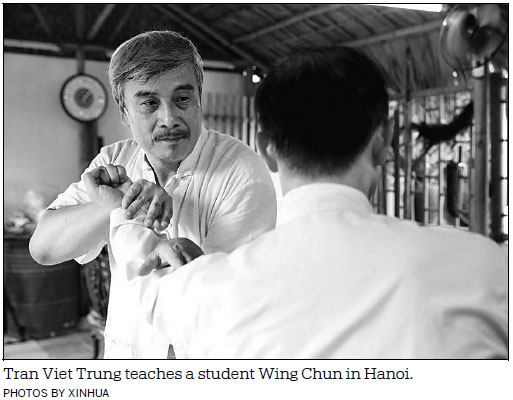Chinese martial arts find a loyal teacher in Vietnam
Sitting in a cozy room full of books, herbal medicines and cold remedies on the tranquil outskirts of Vietnam's capital, Hanoi, is a grey-haired businessman, who has created a new school of Wing Chun and cured patients using Chinese martial arts and medicine. He has also written best-selling books about these undertakings.
In Tran Viet Trung's room, above a bookcase packed with Chinese, English and Vietnamese dictionaries, medicine books and novels is an altar with portraits of four well-known kung fu grand masters and physicians. They include Yuen Chai Wan, better known as Nguyen Te Cong, the Chinese-born founder of Wing Chun in Vietnam, and one of his proteges, Ngo Sy Quy.
Sitting near an antique medicine cabinet with dozens of drawers filled with herbs, minerals and animal bones, the 60-year-old businessman recalls the ups and downs in his life, especially his luck in meeting respected kung fu masters and practitioners of traditional medicine, who inspired him to follow the path of martial arts and healing.

"When I was 8 years old, my father passed away. Weak and bullied by other children, I wanted to learn martial arts to make myself stronger," Trung says.
Trung could not completely devote himself to studying martial arts as a teenager and during the war. But he never gave up on his burning desire to master them.
"If you have a passion and keep pursuing it, you will eventually make it," he says.
After graduating from the Foreign Trade University in Hanoi, Trung met Quy, one of Cong's first Vietnamese proteges.
Wing Chun is a concept-based traditional Chinese kung fu style that requires practitioners to undergo intensive physical, mental, breathing, energy and force training in a relaxed manner. It's famous for quick arm movements and maintains practitioners' flexibility and softness, and helps practitioners to develop the strength to fight back, borrowing concepts from the flexible nature of bamboo.
Notable Chinese practitioners of Wing Chun include Ip Man, Bruce Lee and Donnie Yen.

"After coming to Vietnam in the late 1930s, Cong taught Wing Chun to local proteges, including my master, Ngo Sy Quy," says Trung.
Trung says he has visited Cong's native Guangdong province and talked with Wing Chun masters there to obtain a better understanding of the martial art's origin.
"Soon after I studied Wing Chun with Ngo Sy Quy, he told me to teach my own students while learning from him at the same time. I was surprised because I was just a student. So, I wondered: how could I teach others?" Trung recalls.
Trung followed his master's advice.
Trung has taught Wing Chun to many students in Hanoi since the late 1980s, first at martial arts centers in the bustling downtown and then in the tranquil countryside at his new house next to a pagoda and a communal temple. In 1987, he asked for his master's permission to establish a new school of Wing Chun named Duong Sinh Nhu Quyen.
"I created the new school to make Wing Chun more suitable to the physiques and statures of Vietnamese people and to modern times, focusing on softness and flexibility, like that of snakes and cranes," Trung explains.
Trung runs a factory that produces handcrafted painting tools for export to support his family and spends a lot of time teaching martial arts free of charge.
"I don't make a living by teaching martial arts or practicing traditional medicine. No matter how modern societies have become, we still have dao nghia (sets of basic human relationships) because if we live in an upright, sincere manner, with care and sacrifice, we will receive priceless things," says Trung.
According to Trung, traditional medicine and martial arts "seem to be interrelated, always supporting each other to cure the sick and protect the weak". And the two are not of the past, but, rather, of the present, provided practitioners receive good training and environments.
To preserve and promote traditional medicine and martial arts, Trung not only offers almost-free medical treatments and teaches Wing Chun but also writes books about the two practices.
He had written the book, Quyen Su (Kung Fu Master), based on the lives of Cong and Quy.
"This year, I will publish a book about my parents, especially about the life of my father, Tran Tu Binh, one of the first 11 military generals of the People's Army of Vietnam. He worked as the Vietnamese ambassador to China in the 1959-67 period," Trung says.
"I was named Viet Trung (Vietnam-China) because my father at that time worked as an ambassador to China."
Now, Trung wants the values of traditional medicine and martial arts, especially those of Vietnam and China, to benefit more people and be passed down for generations.
Xinhua
(China Daily Global 11/05/2019 page16)


















